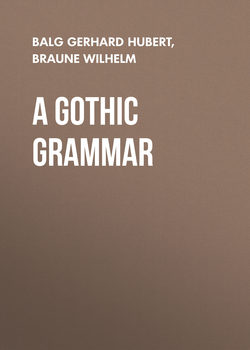Читать книгу A Gothic Grammar - Braune Wilhelm - Страница 20
INFLECTION
CHAP. I. DECLENSION OF SUBSTANTIVS
B. N-DECLENSION (WEAK DECLENSION)
Оглавление1. Masculins
§ 107. Paradim: guma, man.
§ 108. Like guma inflect a great many masculins; e. g., staua, judge; hana, cock; skula, detter; mêna, moon; atta, father; ahma, spirit; blôma, flower; milhma, cloud; hliuma, hearing; weiha, priest; swaíhra, father-in-law; magula, litl boy; pl. brôþrahans, brothers (J. Schmidt, 'Idg. Neutra', 16); —bandja, prisoner; haúrnja, trumpeter; fiskja, fisher; timrja, carpenter; arbja, heir; wilja, wil; manamaúrþrja, (man-)murderer; waúrstwja, workman.
Note 1. aba, man, has the gen. pl. abnê, dat. pl. abnam; of aúhsa, ox, occurs the gen. pl. aúhsnê. Cp. the neuters in § 110, n. 1. Onse (I. Cor. IX, 9) we meet with the acc. pl. aúhsununs which either stands for aúhsuns (according to § 80, n. 1; cp. Anz. fda. 6, 120) or for aúhsnuns (Beitr., 8, 115; 12, 543; Brgm., I, 203).
Note 2. The long stems in -ja do not contract the ji of the gen. and dat. sg. into ei (s. § 44, n. 1); hense, bandja, gen. bandjins, dat. bandjin.
2. Neuters
§ 109. Paradim: haírtô, hart.
§ 110. Like haírtô inflect but few substantivs: augô, ey; ausô, ear; barnilô, litl child; auga-daúrô, window; þaírkô, hole, ear of a needl; kaúrnô, corn; sigljô, seal. Cp. J. Schmidt, 'Indog. Neutra', 106 et seq.
Also the weak adjectivs (§ 132).
Note 1. Irregular forms occur in the pl. of the neuters namô, name, and watô, water. The sg. inflects like haírtô. Paradim:
The pl. of watô occurs only in the dat. watnam. Cp. § 108, n. 1.
Note 2. To the dat. sg. sunnin which occurs (twice) in the frase: at sunnin urrinnandin (Mk. IV, 6. XVI, 2), belongs perhaps a neuter sunnô (not a m. sunna), beside the f. sunnô, sun (§ 112). – Cp. Mahlow, 'Die langen vocale a, e, o', p. 156, and Sievers' comments on this in the appendix to the 3d G. edition of this grammar.
Note 3. The word gajukô which was formerly regarded as n., is f., 'a female cumpanion'. Cp. Bernhardt's 'Vulfila', comment on Phil. IV, 3.
3. Feminins
§ 111. The feminins of the n-declension ar divided into two classes: stems in -ôn- and -ein-. Their inflection is the same. Paradims: tuggô, tung; managei, multitude.
§ 112. Like tuggô inflect many substantivs; as, qinô, woman, wife; ûhtwô, dawn; swaíhrô, mother-in-law; azgô, ashes; gatwô, street; staírnô, star; wikô, week; sunnô, sun (cp. § 110, n. 2); —arbjô, heiress; brunjô, brestplate; tainjô, basket; niþjô, female cuzin; raþjô, account.
Note 1. Also the feminins of the weak adjectivs inflect like tuggô (§ 132).
§ 113. Nearly all substantivs inflecting like managei ar derived from adjectivs. Such an abstract in -ei may be formd from every adjectiv, hense the great number of these words; e. g., diupei, depth; laggei, length; bleiþei, mercy; mikilei, greatness; braidei, bredth; frôdei, wisdom; hardu-haírtei, hard-hartedness; drugkanei, drunkenness; sum can not be referd to corresponding adjs., but they likewise denote a state; e. g., þaúrstei, thirst; magaþei, maidenhood. But very few hav a concrete meaning; as, aiþei, mother; þramstei, locust; kilþei, womb; marei, sea; ƕaírnei, skul.
Note 1. There is a close resemblance between adjectival abstracts in -ei and the verbal abstracts in -eins (cp. § 103, n. 1); e. g., háuhei, height (< háuhs), but háuheins, a heightening, praise (< háuhjan). Both hav the acc. sg. háuhein.
In one case there is confusion. In Jo. X, 33 we meet with a gen. sg. wajamêreins (nom. wajamêreins, blasfemy) from which it is customary to infer a nom. wajamêrei, tho in its meaning such a form is impossibl.
Note 2. In Cod. B. three nominativs sg. in -ein ar found: liuhadein, illumination; II. Cor. IV, 4 (liuhadeins in A; comp. this passage in Bernhardt's 'Vulfila'); wiljahalþein, favor; Col. III, 25 (wanting in A); gagudein, piety; I. Tim. IV, 8 (gagudei in A).
Note 3. The comparativs, the superlativs in -ma, and the prs. participls form their feminin like managei (cp. § 132, n. 4).
